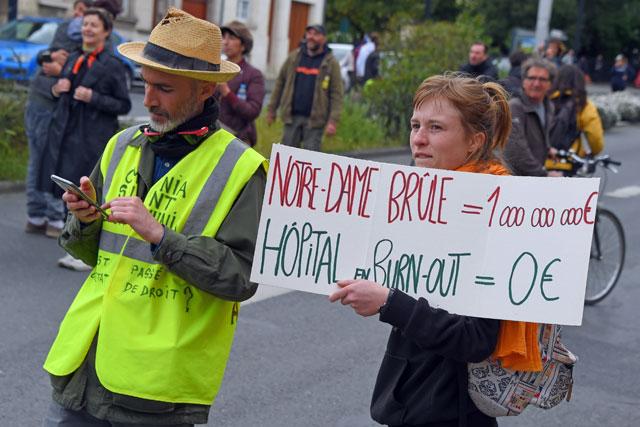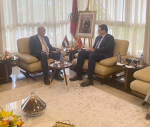You are here
France marks 80 years since Strasbourg's WWII liberation
By AFP - Nov 23,2024 - Last updated at Nov 23,2024

French President Emmanuel Macron (foreground second right) stands in respect during a memorial tour at the site of the Natzweiler-Struthof World War II concentration camp, eastern France, on Saturday (AFP photo)
STRASBOURG, France — French President Emmanuel Macron marked on Saturday the 80th anniversary of Free French troops liberating the eastern city of Strasbourg from Nazi occupation and called for overlooked victims of World War II to be honoured.
The president reviewed troops and attended a military ceremony at the Broglie Square in central Strasbourg, bowing before a monument to General Philippe Leclerc who led Free French troops into the city on November 23, 1944.
"When we knew the flag was up on the cathedral, we had reached our objective -- freedom, freeing Alsace, a province dear to the heart of the Second Armoured Division," said Roger Le Neures, a 101-year-old veteran of the fight present at the ceremony.
The general, who commanded the Second Armoured Division, and his men had sworn three years earlier while fighting in Libya to one day liberate Alsace.
France's colours flew from the cathedral's spire during the ceremony in homage to the city's liberators.
Macron was also scheduled to visit Natzweiler-Struthof, around 60 kilometres west of Strasbourg, the only concentration camp built by the Nazis on French soil.
Speaking after the ceremony in Strasbourg, the president highlighted the fate of tens of thousands of Alsatian men forcibly enlisted into the German army.
"These children of Alsace... were captured, dressed in a uniform they loathed in the service of a cause that made them slaves, instruments of a crime that killed them too, and threatened with reprisals if they attempted to flee," he said.
The conscripts' "tragedy must be named, recognised and taught"" Macron added.
'Strange defeat'
Berlin saw Alsatians as its own citizens after annexing the province -- fought over for decades by France and Germany -- following France's defeat in 1940.
The forced conscription is "something that's always been misunderstood", said 99-year-old Jean-Marie Hostert, one of the surviving members of this group known as "Malgre-nous" ("against our will").
"We didn't want to go" to fight alongside the Germans, added Hostert, speaking during the commemorations in Strasbourg.
Some have tied the "Malgre-nous" group to the 1944 massacre at Oradour-sur-Glane, one of the worst mass killings of civilians by the Nazis in western Europe.
"Following the war, people wanted to highlight the memory of heroes, resistance fighters, everything that could bind France together again," said historian Christophe Woehrle.
"In that whole story, the 'Malgre-nous' are a bit of a stain. It's not glorious. It's not something you can build a national memory from," he added.
Macron also announced that scholar and Resistance fighter Marc Bloch, tortured and executed by the Gestapo in 1944, would be reinterred in the Pantheon -- the Paris monument to France's greatest citizens.
Bloch would be honoured "for his work, his teaching and his courage", the president said, calling him a "man of the Englightenment in the army of the shadows" -- the nickname for the French Resistance.
A First World War veteran and medieval history professor in Strasbourg from 1919 to 1936, Bloch revolutionised the field by bringing in ideas from sociology, geography, psychology and economics.
His 1940 book "L'Etrange Defaite" ("The Strange Defeat"), only published after the war, blamed France's elites for failing to prepare adequately for war with Nazi Germany.
At Struthof, Macron will re-light an eternal flame in memory of people sent to the concentration camps.
Around 17,000 of the 50,000 interned at Struthof and its satellite camps during the war died or disappeared.
Related Articles
STRASBOURG, France — Dozens of French police cordoned off an area in southern Strasbourg on Thursday where a gunman who opened fire at the c
PARIS — Thousands of trade unionists and activists from left-wing parties marched with yellow vest protesters through Paris on Saturday to p
STRASBOURG, France, — French President Emmanuel Macron warned on Tuesday that divisions between democracy and authoritarianism in Europe wer



















